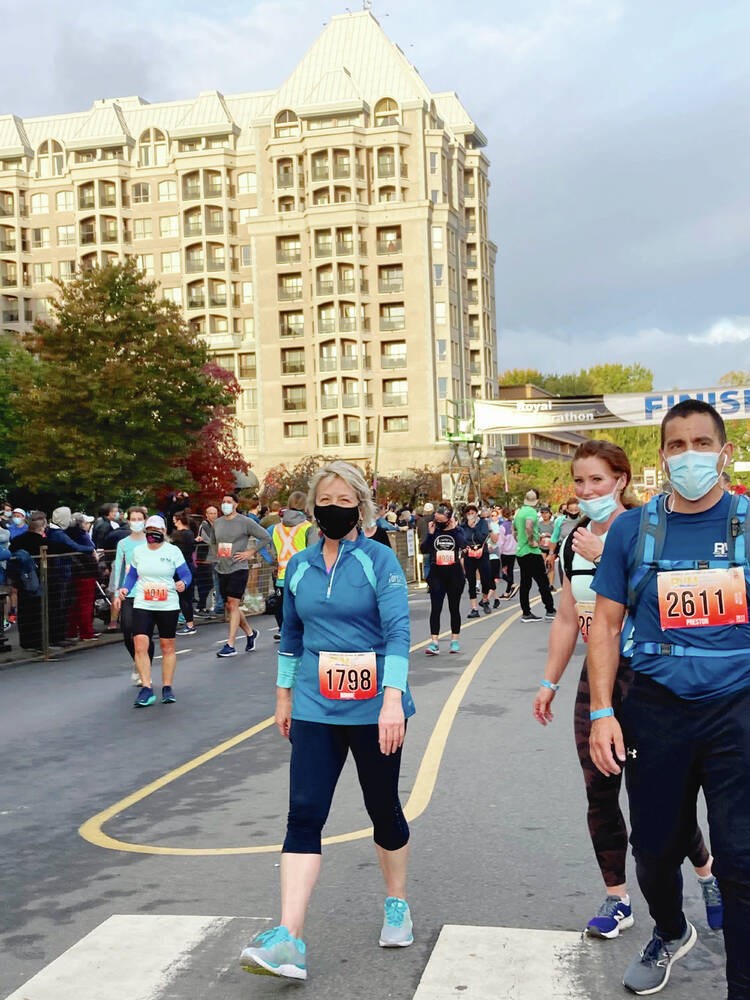As runners crossed the finish line in the first in-person Royal Victoria Marathon 8K race since 2019, many had their names called out.
Crossing quietly without that honour, however, was Dr. Bonnie Henry, B.C.’s provincial health officer, even though she finished in the top five in her age category.
Henry also didn’t run alone — she had a male and a female security officer on her heels.
Given the anti-vaccination crowds downtown in the days prior to the race — which longtime Royal Victoria organizer Rob Reid described as more of a mob than demonstrators — there was concern for the safety of the woman who has led the province through the COVID-19 pandemic.
“It wasn’t anything formal in not saying her name or anything,” said Reid, “but we just wanted to downplay it.”
Announcer Rod McCrimmon said Henry’s name never came over the scroll of names from which he tries to read as many as possible, especially notable ones. “I think it was by design.”
Jenny Carnie, who ran the race and admits to being in awe of the provincial health officer, snapped a photograph of Henry with her phone. “I watched her come off the course demonstrating the message she’s been sharing with the population — she was beautifully calm, kind and safe as she crossed the finish line,” said Carnie. “We are just so fortunate for her leadership.”
Henry said in a phone interview later that she was thrilled to be part of the return of the race amid vaccinated crowds. The scaled-down event featured 2,715 people in the half-marathon and 1,704 for the 8K. “I felt really like it was so much positive energy to be out there again. It was great.”
But she acknowledged that pushback over COVID masking and immunizations has escalated to a “concerning” degree since admission to non-essential venues like restaurants and gyms has been limited to those who show the B.C. Vaccine Card.
The threats have “really been discouraging,” she said.
Critics range from those who think the province should have adopted masking mandates and lockdowns earlier, and been better prepared for the arrival of the fourth wave and Delta variant, to those so infuriated by masking and vaccine mandates that they have called for Henry to be hanged or shot.
“It’s a whole new level of concern when people try and dehumanize others and, you know, me, for example,” said Henry, who has a 24-hour security detail at work and home in Victoria.
“It minimizes the really important tragic events that have happened in our history to bring up things like Nazism and it’s just very worrisome that the discourse would go to that level.”
Henry said she finds hope in the silent majority who have been vaccinated — 83.9 per cent of those age 12 and older are fully vaccinated in B.C. — thereby looking out for their families, neighbours and community.
She said she admires Nell Saba, who has taken it upon herself to peacefully hold her own sign reading “Vaccines Save Lives, Ignorance Kills” during anti-vaccine protests at the B.C. legislature. “[She] just very quietly and calmly puts her voice out there.”
Henry said the threats of violence are upsetting not just for her, but for her family, friends and colleagues, adding there is a sexist element to the vitriol levelled at her and her female counterparts — just as threats against Saskatchewan chief medical health officer Dr. Saqib Shahab are often tinged with racism.
“I didn’t expect this level of of personal attack and it’s discouraging and upsetting, and I do believe that some of it is because I am a woman — and a woman who has in a position of authority, which is, I guess, frightening for some people,” Henry said.
Carnie noted that the provincial health officer has even been attacked for making decisions on COVID in schools and not having children of her own.
“I don’t think a man’s domestic life, or the fact that he’s had children or not, would play into the decisions that he makes — there is a major double standard that she faces, but she adapts and she’s resilient and she just hangs it up, she steps up and she just shows up.”
Henry said despite the anti-vaccination protests, there have been huge upheavals for good during the pandemic, citing the Black Lives Matter movement and collective recognition of the trauma of residential schools.
The pandemic has also exposed long-time inequities for people who work in low-paying jobs, and the importance of schools in supporting communities and families, she said.
“I hope that we can build back in a way that is more just and recognizes some of those inequities,” Henry said.
“I do think there’s lots of things that we have learned that … we need to hold onto as we get through this.
“And you know, partly, I hope I won’t need my RCMP officers forever.”



